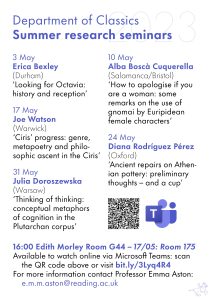When the Greek department of the Sorbonne University invited me to spend a term in Paris as visiting professor, my first instinct was to refuse. Owing to having been assaulted and insulted in equal measure there in my younger days I’d vowed never to set foot in France again – in fact I’d made that vow twice, having imprudently given France a second chance once before. But then again, can one really turn down an offer from the Sorbonne? The chance to teach some of the world’s top students, and to do it in French? Working with top scholars, using some of the world’s best libraries? So in the end I nervously accepted.
I needn’t have worried; perhaps France has changed, or maybe it’s just that I’ve gotten older and less attractive, but in two months there I was not attacked once. In fact, everyone was lovely to me (even the supervisor of the apartment building – previously I had never even heard of a nice super), and I had a great time. The library was amazing, and the students were terrific. A group of them worked together with me to make an edition and translation of an unpublished text: deciphering something that probably hadn’t been read in centuries, comparing the manuscripts to work out how they are related and which readings are more likely to be original, making an apparatus criticus, translating the text, tracking down quotations and historical references to figure out when and where it was first written, etc. Of course this process couldn’t be fully finished in two months, particularly as a sharp-eyed student found more manuscripts of our text just before I left Paris, but that means that we’re still working on it remotely, which is also fun. I can’t tell you quite what the text is, because we still don’t entirely know, but part of it consists of letters between a (probably fictional) fifteenth-century university student and his family. The family accuses the student of wasting time and money, and he assures them that he is studying very hard and never ever goes to parties, except for the ones that all the students attend …
I also gave lectures summarising my forthcoming book on Latin loanwords in ancient Greek. The book itself put a bit of a damper on my Paris visit, because the second proofs arrived while I was there. They were better than the first proofs, which had blighted my existence from September to January, but still problematic enough to put strict limits on the amount of sightseeing I could do during the four weeks for which I had them. However, when I managed to stop thinking about the problems in the proofs turning the book into French lectures was great fun. One lecture on which Latin words the Greeks chose to borrow and why, one on when and where they borrowed Latin words, one on what happened to the ancient loanwords in Byzantine and modern Greek, and one on what the evidence is for all this, how borrowing worked, and why the relationship between English and French is uncannily similar to that between Latin and Greek … I was in clover.
Nevertheless, in some respects teaching in Paris has given me an enhanced appreciation of Reading. Paris seems to be constantly full of demonstrations, protests, and occasionally riots; the main issue of contention while I was there was that people did not want the retirement age to be raised from 62 to 64, but there were also protests about many other issues, some completely beyond my comprehension. The French seem to take to the streets at the level of concern that would cause a British person to sign an online petition. And the Sorbonne is so afraid of being invaded and looted by protesters that every time there is the slightest danger, the whole university closes down and all classes are held on Zoom. One day when no big demonstrations were planned the Sorbonne nevertheless closed because there were about three students standing in front of one entrance to the main building and ‘blocking’ it with a little pile of wheelie bins and e-scooters. The door could have been unblocked in under 10 minutes by one not very strong individual, or we could just have used the other doors, but no – the whole university shut down, even departments in completely separate buildings. I found it very entertaining, though the amusement clearly wears off when one deals with this kind of thing on a regular basis.
Even when the university is open, teaching at the Sorbonne is not without difficulty. All classes are hybrid, but the IT is unreliable. You start off a class and then have to stop after 5 minutes because the online audience can’t see the slides, or because they can’t hear, or because the technician that you booked for an hour beforehand to solve these issues has finally showed up only after the start of the class. Then the technician takes a quarter of an hour of class time trying and failing to make the IT work, so not only do you have to abandon the online audience, but by the time he leaves everyone in the room has forgotten what happened in the first 5 minutes and you have to start over.
So despite how much fun Paris was, it’s also nice to be back here – and I am so glad that Reading decided against hybrid teaching!
Written by Professor Eleanor Dickey













